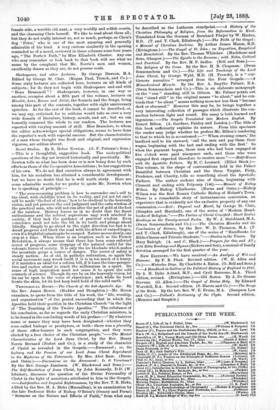Social Studies. By R. Heber Newton. (G. P. Putnam's Sons.)
—This is a thoughtful, suggestive book. The socio-political questions of the day are treated historically and practically. Mr. Newton tells us what has been done or is now being done by such efforts as those of the Co-operative Associations ; he has suggestions of his own. We do not find ourselves always in agreement with him, for his socialism has attained a considerable development ; but we have no doubt that he is well worth study. Here are some admirable words, for we prefer to quote Mr. Newton when he is speaking of principle:- `` The ever-recurring problem is how to surrender one's self to the ideal, with childlike trust in its reality, and yet not let one's self be made the fool of ideas ;' how to be obedient to the heavenly vision, and yet preserve the cool judgment and the calm wisdom of the practical man, who will not run after the pot of gold at the foot of the rainbow. History leaves us in no doubt that the finest enthusiasms and the noblest aspirations may work mischief in society, if they lack the guidance of practical wisdom. Even conscience must not take the bit in its teeth and plunge ahead blindly. Simply to go ahead in the right direction too fast is to derail progress and block the road with the debris of ruined hopes, even if a frightful catastrophe be escaped. Nature moves slowly, one step at a time. When there is an eruption such as the French Revolution, it always means that there has been some enforced arrest of progress, some stoppage of the natural outlet for the volcanic forces of society. It is only the ice blockade which makes the mountain gorge a source of danger. The secret of safety is steady motion. As of old, in pathetic reiteration, so again the social movement may wreck itself, if it is in too much of a hurry, if it mistakes an ideal for a reform bill, if it loses the time-perspec- tive and rushes ahead to reach the millennium in a spurt. Its sense of high inspiration must not cause it to spurn the cold counsels of science. Though its eye be on the heavenly vision, let its ear be open to the voice of experience; and, while its head fronts the skies, let its feet keep hard hold of the solid earth."


































 Previous page
Previous page